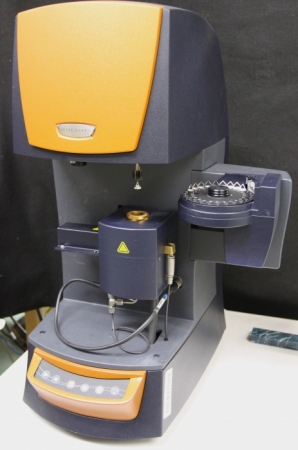
The TA Discovery Thermo-Gravimetric Analyzer (TGA) and Mass Spectrometer (MS) measures the change in mass of a sample as heat is applied in a controlled environment. The evolved gas from the sample can also be routed to a mass spectrometer for identification or to determine a sample's thermal stability, decomposition products, ad-/ab-/de- sorption of gasses, reaction kinetics, Curie point temperatures and more.
The TA Discovery TGA uses an isolated thermo-balance and an innovative IR-heated furnace to measure weight changes as small as 1 microgram across temperature ranges from 30 to 1200 °C. Samples may be analyzed in either an inert (N2 or Ar) or reactive (air) atmosphere and the system's software allows users to switch between atmospheres during a run. More exotic gases can be considered on a case-by-case basis.
Samples are generally run in an alumina sample cup atop a platinum or ceramic hanging pan. The MRL provides the expensive hanging pans while each user is responsible for having his/her own compatible sample cups. The alumina sample cups are available at cost from the MRL on a limited basis. These sample cups can be cleaned and reused many times. We use this set up because it is the most universal set up for our various users.
Mass Spectrometer Use
The exhaust from the TGA furnace can be routed to a mass spectrometer for Evolved Gas Analysis (EGA) up to 300 amu. The technique has a very low detection limit, typically in the PPB range. It can easily resolve the different isotopes of an element. This TGA-MS system is flexible, robust and easy to use. Due to the size of the capillary tube, MS samples are limited to 2 mg unless previous TGA data shows a small mass loss which will not clog the tube. We recommend that all MS users first run their samples on the TGA to establish a baseline of decomposition temperatures from which they can further design their method.
A typical sample size is 1-20 mg. If larger sample sizes need to be measured, contact TEMPO staff to change the default set up. Sample loading into the instrument is controlled by an autosampler robot allowing up to 25 samples to be analyzed without the user needing to be present. The average sample is run in 1 to 2 hours with 30 minutes to cool down. Charges for the TGA are billed by the hour including cool down time.
TRIOS Software
The system is supported by TRIOS software for method development, system control and data analysis. This powerful software can be downloaded onto any windows system for free, allowing MRL users a comprehensive tool for analyzing both TGA and MS data at their convenience. Data may also be easily exported into a tab delimited format.
Some examples of applications
| Property | Method |
|---|---|
| Composition | Step evaluation, residue |
| Thermal stability, decomposition | Step evaluation |
| Stoichiometry of reactions | Content |
| Kinetics of reactions | Conversion, kinetics |
| Adsorption / Desorption processes | Step evaluation |
| Vaporization behavior | Step evaluation, integration |
| Influence of reactive gases | Step evaluation |
|
Moisture |
Step evaluation |
|
Oxidation stability |
Onset, limits |
| Evolved gaseous analysis (EGA) | MS, Onset |
Users interested in larger sample sizes, more exotic gases, custom methods, or MS use should contact TEMPO staff.
For individuals wishing to use the TEMPO TGA-MS, training is available on a quarterly basis.
The TA brochure for the instrument can be viewed at this link for your convenience.
Lab:
Contact:
If you have any questions or would like to find out about the training, please contact amanda [at] mrl [dot] ucsb [dot] edu (Amanda Strom ) at x7925 .
